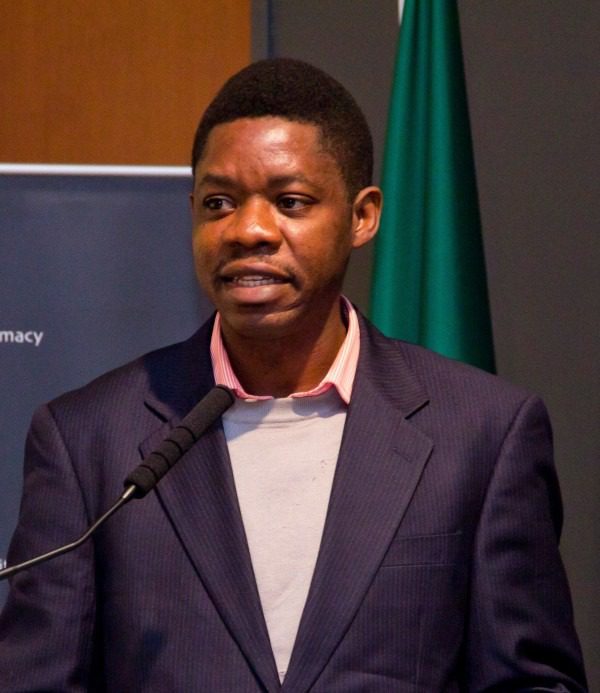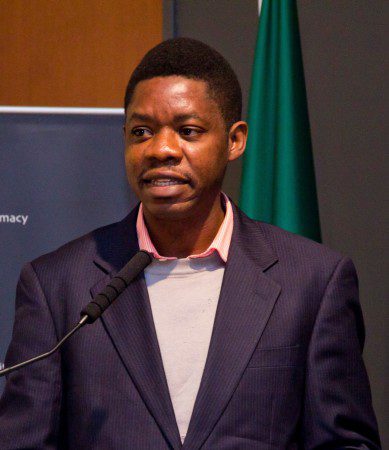Political Issues
Lest We Forget We Won and Why We Won -By Simbo Olorunfemi


Simbo Olorunfemi
Again, I argue that the 2015 election was not simply a political argument but an economic one. The political argument is easier to win, as an incompetent leadership can, of its own failing, simply lose. But losing the argument will only amount to something, if the other party remembers why it won and keeps faith with why it won. To ensure that the economic argument made in causing a change of government in May this year is sustained, it is important that vigilance is maintained, lest the new begin to slide into the wily hands of those who tricked the old into going down the slope.
This is important given that the yearly ritual, the so-called Nigerian Economic Summit is presently on-going in Abuja. The same people who insisted on policies lacking in soul, pretending to be blind to the inequality and poverty eating at the fabric of the society, simply wishing this sore reality away, are back. Those who touted the non-inclusive growth as our all-in-all, years back, are it again. They are back in town, seeking to take back what they lost. They are there – plenty of them at the so-called Nigerian Economic Summit.
It is a relief to see that the Vice President, Professor Yemi Osinbajo, gets it. He understands the argument and boldly spoke up for government directly intervening by way of social investment in the lives of the most vulnerable in the society. That is how it should be. That is what we voted for. To continue to maintain that the economy is all about plotting graphs and power point slides, without regard for the lives of the people held down by years of structural deficiency is naive and wicked. To simply entrust our fate into the hands of ‘experts’ who cannot agree on what the proper definition of ‘recession’ is, and accept our fate as economic illiterates is not an option. Again I quote Robert Neuwirth – “Economics is a subject far too important to be left to the Economists.”
It is weird that every other analyst is talking about non-inclusive growth today, as if the same questions they pose today were not asked of them yesterday, when they were touting their phenomenal ‘growth’ as a major achievement. Watching Mrs. Ibukun Awosika, the Chairman designate of First Bank, make a ‘trickle-down’ argument to the face of the VP who had outlined how the government policy of conditional cash transfer (linked to immunisation, compulsory primary school enrollment and women empowerment) is meant to pull the most vulnerable up from the bottom of the ladder at the summit was quite interesting. She queried the wisdom in social investments on the part of the government, when, according to her, the West is seeking to ditch its social protection programmes. Thankfully, Professor Yemi Osinbajo stood his ground, brilliantly linking social investment to economic development and the overall good of the society, especially one not at the level of the ‘advanced’ societies, Mrs. Awosika cited. Not only has our bottom of the pyramid never received any form of support, not even in those so-called advanced economies will there be a pulling of the plug on social protection programmes anytime soon.
Yet, once the issue gets to funding social protection and addressing inequality, experts flare up. They argue against hand-out for the poor. But what constitutes handouts? Bailing out banks with over One trillion is no handout, they will tell us. It makes sense to the people at the top for government to write their debts off, waive import duties, grant tax holiday and subsidise their luxury, but they get jittery when the government seeks to put N5000 in the hands of the poor. They do the arithmetic and quickly tell us how unsustainable such policy is.
I yearn for understanding from the club of experts who have again gathered at the Nigerian Economic Summit. The questions arise – What are in the solutions canvassed by these so-called experts at the Nigerian Economic Summit (NES) that are in themselves new? They have been touting the same things and influencing governmental policy over the years, where has it taken us? Yet, once the issue gets to funding social protection and addressing inequality, experts flare up. They argue against hand-out for the poor. But what constitutes handouts? Bailing out banks with over One trillion is no handout, they will tell us. It makes sense to the people at the top for government to write their debts off, waive import duties, grant tax holiday and subsidise their luxury, but they get jittery when the government seeks to put N5000 in the hands of the poor. They do the arithmetic and quickly tell us how unsustainable such policy is.
Many of our experts miss it! The so-called handout is no handout, in the sense it is put, if you ask me. It is not one in the sense of simply handing over cash to some laid-back, poor people, who will simply recoil into lethargy once cash is put into their hands. The haughty assumption on the part of the experts at some superior knowledge on the part of the elite, and an exclusive ability to run business for profit is faulty. Assisting the most vulnerable to get off their backs, with some of the basic needs met through social protection schemes, can only free them to add value, even from the bottom, to economic development. Funding high-end enterprise with billions and neglecting to make the millions available for access by those at the bottom of the pyramid is suicidal.
Common sense is not the exclusive preserve of some club of experts and the elite. There is a reason why research indicates that level of loan default is considerably lower at the bottom. It speaks to the strength of character and integrity of people at the bottom, which we can tap into. Why not take risks with the poor? Why must we always take the risk with the rich, seeing that investing in them has not taken us very far? I believe the idea of a conditional cash transfer into the hands of our mothers, linked to compulsory school enrollment and immunisation is a brilliant one, which we must see through. It is important that those who lost the economic argument at the polls do not sneak in, due to our inertia, to take back what they lost and keep the bottom of the pyramid, stuck in the rot, due to no fault of theirs.
Simbo Olorunfemi works for a Nigerian Communications Consultancy.









